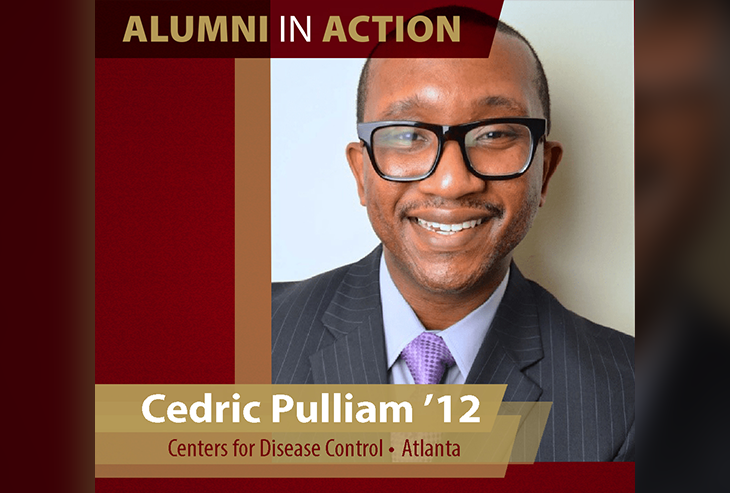Cedric Pulliam has worked for national and international health agencies since graduation to prevent the spread of HIV/AIDS. Now a public health advisor for the CDC, he will work the the nation's top officials in pandemic response.
Cedric Pulliam ’12 has a big job ahead.
As soon as June 1, he is scheduled be in meetings with the White House task force on COVID-19, assisting leaders as they formulate plans to end the pandemic.
Pulliam, a senior public health advisor at the Centers for Disease Control and Prevention in Atlanta, has been in that role just over a year after serving several years with the U.S. Department of State. His primary duties involve assisting agencies and health departments in HIV prevention, working with them to administer grant-funded initiatives around safer-sex practices, outreach and testing.
As COVID-19 emerged this winter, his work shifted to helping agencies meet their missions while physical distancing and telecommuting. That’s led to an increase in at-home, mail-in testing and tele-visits with clients, down to the nitty-gritty of ensuring agency employees have Wi-Fi and computer access to be able to work from home.
His duties are scheduled to shift again next month with a transition to the CDC’s Emergency Operations Center in Atlanta where he will act as chief-of-staff to the primary incident commander and second-in-command beneath CDC Director Robert Redfield. The role will include remote meetings with the White House task force — including President Donald Trump, Vice President Mike Pence, Dr. Anthony Fauci and Dr. Deborah Birx among others.
“If I get to go on that deployment in June, that’s something I’m committed to as a citizen and human being,” Pulliam said. “I’m willing to do what I can to do my due diligence.”
Pulliam will take detailed notes of the conversations and plans discussed in those meetings in efforts to create national plans for pandemic response.
“You have to hit the ground running regardless of who’s in the room,” Pulliam said. “You have to take good notes and have strong auditory memory and be able to type quickly. Things said in these meetings at the time (have national ramifications). Missing aspects of these discussions can be crucial and have an impact on national level.
“It’s a huge responsibility. It’s definitely not for everyone.”
Pulliam took a nontraditional path to public health after graduating from Elon with degrees in political science and international studies.
Drawing on high school experiences overseas, he enrolled at Elon because of the opportunity to study abroad. At Elon, he was heavily involved in campus organizations, student government, and volunteered with an HIV and sexual health organization in Greensboro, N.C. After graduation, he pursued a career in public health and HIV prevention. Among other high-profile agencies, he worked for USAID for two years in the Bureau of Global Health and Office of HIV/AIDS, beneath ambassador Birx, and with the U.S. Department of State for nearly four years.
While working, he collected master’s degrees in international studies at Georgetown University and Central European University before earning his doctorate in philosophy in health and medical psychology.
Working with those high-profile agencies to fight HIV/AIDS — meeting with world leaders, diplomats and business leaders around the globe — trained him for the pressure and attention he will face this summer.
His shift with the Emergency Operations Center is expected to last about a month of 12-hour days, six days a week before he prepares a successor to take on the role.
“My hopes and aspirations for how we get through this COVID-19 pandemic are that we make sound, smart and logical decisions. That means personal decisions backed by thinking things through and common sense,” Pulliam said. “There are so many things we have to work on, and work on together so that we can keep people safe and healthy.”



